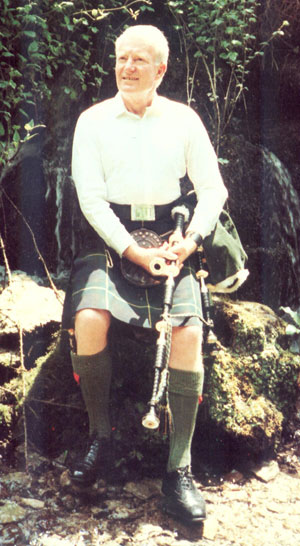Bruce Thomson
(1930 - )
Born in Assam, India to a Scottish tea planter from Peterhead and a mother from Longside in Buchan, I was sent home to school in Scotland aged 6, first to Aberdeen Grammar School, and then to Glenalmond College in Perthshire.
Whilst a pupil there I started the pipes. This was during the ’39-45 war and so we did not have one teacher but were taught by the Black Watch and other pipers from Perth on Wednesday afternoons. Pipe-Major Sinclair is the man who sticks in my mind, mainly because I bought my first set of pipes from him: a set of Duncan MacRae drones and a 1930 Robertson chanter. The other influence at school was Mr. Charles D. MacTaggart who had himself been to the school.
Further tuition came from Pipe-Major Cherry Anderson at Bridge of Don Barracks, Aberdeen, during school holidays. It was he who introduced me to Piobaireachd.
It was my great good fortune to be stationed at Fort George during 1949-50 and recieve lessons from Pipe-Major Donald MacLeod whilst I was doing National Service. It was extremely good of him to have done this as I could not play in his band, having a commission. It was from here that my composing grew. It all started slowly and Donald would make encouraging noises about some pretty awful tunes. His advice could be like gold dust. A tune called “The Portsonachan Cook” which is now in The Gordon Highlanders Bagpipe Music Collection Book 2, I originally sent to him as a march. He replied that it was not a march but a hornpipe, and in his usual way added that it was the best pipe hornpipe he had ever heard. He then told me what the ending should be, otherwise leaving it unchanged. I have also had help from various people such as Seumas MacNeill, Pipe-Major Brian McRae and others.
My first indication that any of my tunes might be good, came when “The Pass of Brander,” a 9/8 retreat march, won The Castle Minard Competition in 1978. It was judged by Mr. Archie Kenneth and Mr. James Campbell to be the best simple march as well as the best tune overall in the competition. This was why the tune appeared in The Piping Times in March, 1979. In June, 1998 I had another stroke of good fortune when another of my tunes, “Urchfont Manor,” was The Piping Times’ tune of the month. I believe this is still played at the Manor during the piping tuition weekends. Pipe Major Roger Huth had first put forward the idea of having a tune being written to honour the weekend.
All this encouraged me to keep composing, and another tune won the recent composing competition held at Haddington; this was a 6/8 march called “The Haddington Turnpike.”
Being in the south of England during my entire career as a medic, it was not easy to belong permanently to a band, although for a short time I was with the Pride of Sussex. Previously I had been Pipe-Major of the school band for three years and turned out on high days and holidays with the City of Aberdeen Band. Now I play intermittently with the Veterans at The College of Piping and The Royal Scottish Pipers’ Society in Edinburgh.
In 1989, Forfar and Douglas Adamson of Deeay Music, produced a volume of pipe music produced for me called The Piper’s Well. The pipe tunes were set for piano and fiddle accompaniment.
Several other books from the same publisher also have my tunes in them. My own compilations of pipe music are called The Pass of Brander and The Sma Glen. Both have CDs of all the tunes. The Gordon Highlanders Pipe Music Collection Volume Two has four tunes: “The Pass of Brander,” “The Portsonachan Cook,” “Nikki Thomson’s Wedding” and “Tommy Macdonald of Barguillean.” To my delight, this last tune was played by The House of Edgar Shotts and Dykehead Caledonia PIpe Band as their march-on piece at the 2008 World Championships. Other tunes have appeared elsewhere, seven of them in The Caledonian Collection by Bob Murphy, and six in The Speyside Colection by Pipe-Major Trevor Dear.

While the music making flourished I got through a childhood in Buchan and Aberdeen going on to Army Service and Territorial Army in The Gordon Highlanders, followed by an MA in history at Oxford University. A change of career took place when I studied Medicine in London followed by some years of practice in Horsham, Sussex until I retired, first to Brighton, and ten years ago to Crieff in Perthshire. During my university years I was quite involved in sports and won Rugby and Boxing Blues for Oxford by playing in the yearly Matches against Cambridge. Subsequently, I became a Scottish Rugby International player.
Previously, I was a member of The Caledonian Society of London which gave its name to the famous strathspey. I am still a member of The Highland Society of London. As can be seen by “The Haddington Turnpike,” written in 2009, I am still composing.
April 2009
